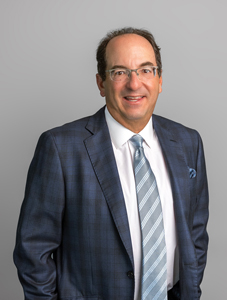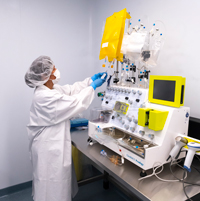 For nearly 40 years, Neil Kishter has assisted others in achieving their financial objectives. As a private wealth manager at Morgan Stanley, Neil has developed strategies that meet the immediate needs and longterm goals of business owners, entrepreneurs, senior executives, and multi-generational families—a thoughtful approach he applies to his philanthropic endeavors.
For nearly 40 years, Neil Kishter has assisted others in achieving their financial objectives. As a private wealth manager at Morgan Stanley, Neil has developed strategies that meet the immediate needs and longterm goals of business owners, entrepreneurs, senior executives, and multi-generational families—a thoughtful approach he applies to his philanthropic endeavors.
Neil’s ardent desire for better outcomes for patients and their families motivates him to keep working so he can continue his philanthropy. “Honestly, I am still working because I want to give back,” Neil shared. His gifts primarily target technology designed for the treatment of blood cancers after his first wife, Dana, passed away following three bouts of leukemia.
“The care Dana received was excellent, but unfortunately, sometimes—with cancer—it doesn’t matter how good the care is,” he said. “The disease is worse.”
That life-changing experience made him keenly aware of hospital budget limitations. His deep belief—which his wife, Emily, shares—is that philanthropy will improve the course of treatment and patients’ lives. As Neil considers the many proposals that cross his desk, he is drawn to those he believes will significantly impact patient care. He explained that discoveries exist that can make treatment less painful and provide more time in remission.
His sense of urgency is transparent. “The medical center knows what to do with the money it gets; it just has to get the funds because certain advancements might take five years or longer to get into the budget. If you invest in them—or part of them—you can transform care right away,” he added. “What you do as a philanthropist will hopefully give results in your lifetime.” Neil typically makes a multi-year gift commitment so that his investment has a more significant impact, allowing the University of Maryland Marlene and Stewart Greenebaum Comprehensive Cancer Center (UMGCCC) to get projects done years ahead of when it otherwise might.
Neil’s relationship with UMGCCC has evolved. Initially, it began while Dana was still in treatment, with their desire to improve the cancer treatment experience by donating new TVs and DVD players for every room in the bone marrow transplant (BMT) unit where she received a transplant. In recognition of the amazing care his late wife received, he began sponsoring the annual employee holiday party, a tradition he continues.
“A BMT patient is in the unit for a couple of months on average, so I developed a close relationship with the faculty and staff,” Neil said. When Dana’s doctor, Director Emeritus Saul Yanovich, MD, later related the details of more significant needs, Neil was motivated to help. Since then—in collaboration with the former UMGCCC director, Kevin Cullen, MD, and hematologic oncologist, Aaron Rapoport, MD—he has supported the purchase of cutting-edge treatment equipment and the construction of an expanded family relaxation area. In Dana’s memory, this dedicated area accommodates more loved ones inside the air-filtered unit, which patients cannot leave.
Before Neil commits to a gift, he educates himself about the technology. “When I hear about a cutting-edge device or treatment, I love to be a part of it from the ground floor because I know it’s going to change lives.”
 Neil purchased UMGCCC’s first Prodigy machine about 11 years ago. The equipment alters a patient’s cells for chimeric antigen receptor (CAR) T-cell therapy to destroy cancer cells. UMGCCC was the first cancer center in the Maryland-Delaware-Virginia region to offer Car T-cell therapy, but it relied on other facilities to modify patient’s cells. The first machine significantly improved patient care, which led Neil to gift a second one, furthering UMGCCC’s position as the region’s most advanced cell therapy research and production laboratory.
Neil purchased UMGCCC’s first Prodigy machine about 11 years ago. The equipment alters a patient’s cells for chimeric antigen receptor (CAR) T-cell therapy to destroy cancer cells. UMGCCC was the first cancer center in the Maryland-Delaware-Virginia region to offer Car T-cell therapy, but it relied on other facilities to modify patient’s cells. The first machine significantly improved patient care, which led Neil to gift a second one, furthering UMGCCC’s position as the region’s most advanced cell therapy research and production laboratory.
“Having our own cell-processing laboratory and the Prodigy machines has transformed our ability to offer our patients novel and promising next-generation cell-based therapies,” Dr. Rapoport said. “It also has helped our investigators move their basic and preclinical research into the clinic more quickly so patients may benefit from our discoveries.”
Neil believes that making a transformative difference takes community support. “Although challenging at times, I channeled my pain into positivity for others,” he said. “People inspired to give can take the first step by deciding what’s most important to them.”